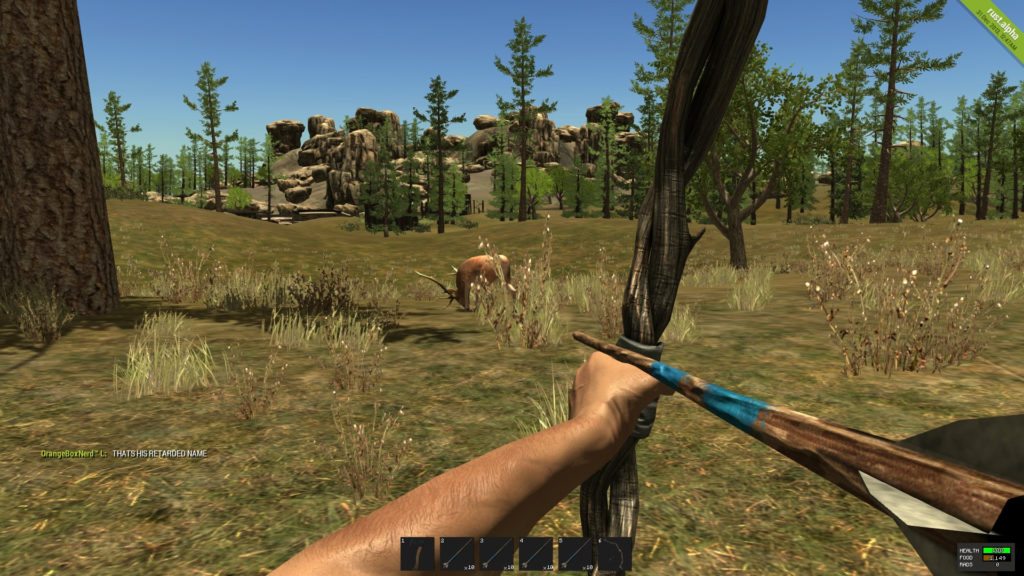Rust is a systems programming language focused on speed and safe concurrency, and which I’ve been using for personal projects heavily since the 1.0 release last year. Most of these projects have been replacements for existing scripts in my workflows or new command line tools, but I wanted to create a Mac application and determine if it would benefit from Rust’s memory efficiency, safety, and robust library ecosystem.

I’ve done iOS and Mac application development for many years and it's worth noting that the hardest part of Cocoa development has always been learning the frameworks rather than the languages. This experiment is about applying Cocoa and Rust knowledge to create something safe and yet easy to work with.
Getting started with Cocoa crates

There are already crates for working with the Objective-C runtime, such as the [CODE]objc[/CODE] and [CODE]block[/CODE] crates, which are for using the runtime directly and interfacing with Apple’s block extensions respectively. The [CODE]objc[/CODE] crate in particular provides the [CODE]msg_send![/CODE] macro, which is a basic interface to messaging Objective-C objects. Here’s an example of creating an [CODE]NSObject[/CODE]:
Rust is a systems programming language that runs blazingly fast, prevents segfaults, and guarantees thread safety. For installation it's advised to use rustup as it will (among other things) allow you to switch between versions of Rust without having to download anything additional. Once rust setup process completed, Add below command to to your bash profile(/.bashprofile) source /.cargo/env Check if rust is installed on your mac? Relauch your terminal and run this below command. This command will print your rust compiler version on your terminal. If you get rust compiler version displayed, then you are good to go.
- Rust for Mac, free and safe download. Rust latest version: An online survival game inspired by Minecraft and DayZ. Rust is a title that blends many of gamings most. It looks like you’re running macOS, Linux, or another Unix-like OS. To download Rustup and install Rust, run the following in your terminal, then follow the on-screen instructions.
- Dec 22, 2020 Rust Download PC Free Game latest update is a direct link to windows and Mac. Rust Free Download Mac Game Full Version Highly Compressed via direct link. Download the free full version of Rust for Mac OS X, and PC. Rust Game It Is Full And Complete Game. Just Download, Run Setup, And Install. Rust Download PC Free Game Overview of Rust Full Games.
- Rust Furnace Calculator app is a great application that is also installable on PC. The Rusty Furnace has developed it and, the popularity of Rust Furnace Calculator software is increasing awesomely. Download Rust Furnace Calculator for PC to install on Windows 10, 8, 7 32bit/64bit, even Mac. The weight of the apps is 6.1 MB.
-- CODE language-rust --
unsafe {
let cls = Class::get('NSObject').unwrap();
let obj: *mut Object = msg_send![cls, new];
}

The [CODE]cocoa[/CODE] crate builds on this to provide an interface to using frameworks including AppKit for drawing windows and views onscreen. It also has an interesting take on implementing Objective-C classes in that translates them to traits which are implemented by a generic [CODE]NSObject[/CODE] type. This snippet creates an app and a window, and presents it on screen:
-- CODE language-rust --
unsafe {
let _pool = NSAutoreleasePool::new(nil);
let app = NSApp();
app.setActivationPolicy_(NSApplicationActivationPolicyRegular);
let window = NSWindow::alloc(nil).initWithContentRect_styleMask_backing_defer_(
NSRect::new(NSPoint::new(0., 0.), NSSize::new(200., 200.)),
NSTitledWindowMask as NSUInteger,
NSBackingStoreBuffered,
NO
).autorelease();
let title = NSString::alloc(nil).init_str('Hello World!');
window.setTitle_(title);
window.makeKeyAndOrderFront_(nil);
app.run();
}
Pretty cool, though as is, the entire interface is unsafe, missing the hopeful goal of the experiment. This approach could still be interesting when writing the application core code in Rust, and then packaging it using Cocoa bindings.

Wrapping Cocoa APIs in “safety”
Given those caveats, couldn’t we create Rust wrappers for Objective-C classes? Of course! After some trial and error, I had a base trait to use for wrapping and interacting with Objective-C objects:
-- CODE language-rust --
use objc::runtime::Object;
pubtype Id =*mut Object;
pubtrait ObjCClass: Sized {
/// Returns pointer to underlying objc object
fnptr(&self) -> Id;
/// Creates an instance from an objc object pointer, failing/// if the pointer is not an instance of the wrapped class
fnfrom_ptr(ptr: Id) -> Option<Self>;
/// The printed name of the class
fnclass_name() ->&'static str;
/// Type-safe reference to an instance with a nil pointer
fnnil() -> Self;
/// Performs an `isKindOfClass` check to whether a particular/// pointer is an instance of the wrapped class
fnptr_is_class(ptr: Id) -> bool;
/// Change an instance of one class into another, failing if/// the pointer is not an instance of the preferred class./// Useful for converting between inherited classes e.g./// NSDictionary to NSMutableDictionary.
fn coerce<T: ObjCClass>(&self) -> Option<T> {
T::from_ptr(self.ptr())
}
/// Designate this instance as suitable for being released/// once it is out of scope
fnautorelease(&self) -> Self;
/// Drop the Objective-C reference. The object is then invalid
fnrelease(&mutself);
}
Macos catalina official download. Note that this creates a Rust object with a reference to an Objective-C object, but the overall effect is minimal as most interaction still happens in Objective-C runtime land.
Using this trait was most easily done creating a handy macro named [CODE]impl_objc_class[/CODE], and then wrapping the average class became easy! Here’s an example which wraps a few methods on [CODE]NSString[/CODE].
-- CODE language-rust --
const UTF8_ENCODING: NSUInteger = 4;
impl_objc_class!(NSString);
impl NSString {
/// Creates an `NSString` from a `str`.
pub fn from(content: &str) -> Self {
let ptr: *mut Object = unsafe {
let string: *mut Object = msg_send![class!('NSString'), alloc];
msg_send![string, initWithBytes:content.as_ptr()
length:content.len()
encoding:UTF8_ENCODING]
};
NSString { ptr: ptr }
}
/// The length of the string as measured in UTF-8 code points
pub fn len(&self) -> usize {
unsafe { msg_send![self.ptr, lengthOfBytesUsingEncoding:UTF8_ENCODING] }
}
}
The class can now be used directly, and without [CODE]unsafe[/CODE]:
-- CODE language-rust --
let greeting = NSString::from('hello');
assert_eq!(greeting.len(), 5);
Resources still need to be released (or auto-released, if applicable) when they are no longer needed, but classes became much easier to use. I explored some options such as implementing a [CODE]Drop[/CODE] trait to automatically discard Objective-C objects once the Rust reference goes out of scope, but this behavior is not always desirable, especially when working with references to applications and windows which are expected to stay for the life time of the application, or at least longer than the current scope.
Packaging Rust into an app
While we can use the snippets of the cocoa crate to run an executable, the executable is not packaged as an app bundle, which would be suitable for having an app icon, putting an app in the dock, or being registered as a default application (like being the mail client used for [CODE]mailto:[/CODE] links, for example). For that, we’d need to package the executable into an app bundle.
An easy way to create an app bundle which launches Rust code is to create a Cocoa app with a Rust and dependent app target. This requires a few steps in Xcode:
- Create a new app using the Cocoa app template
- Add a second “External build system” target to the application which creates the Rust binary
- Add the second target to the default app target as a dependency
- Add the rust executable as a bundled resource of the app target
- Replace the default AppDelegate with a script to launch the Rust binary, something like this bit of Swift:
-- CODE language-rust --
let task = Process()
task.launchPath = Bundle.main.path(forResource: 'my-rust-program', ofType: nil)
task.launch()
task.waitUntilExit()
Blackweb gaming mouse pad. I’ve created an example which shows all of these parts in action, adds an app icon, and pipes output from the Rust executable to the system console.
Conclusions
The initial results were less than ergonomic when using the existing Cocoa crate since the interface did not add additional safety, and perhaps removed some because the generic object type conformed to every Cocoa class trait. I could (and did) call the wrong methods on Cocoa class instances.
Rust Free Classics
Writing my own layer of classes on top of [CODE]objc[/CODE] improved the latter, though it was more initial overhead to write wrappers before using classes, and still felt clumsy when converting between values in class clusters for example. There is potential for a “Rustier” crate for interfacing with Objective-C, or a generator which makes ergonomic method names. Despite this, I mapped a number of Objective-C classes by hand, and while my stylistic choices probably aren’t suitable for a general use library, Rust+Cocoa became very fast to use and iterate on ideas. The approach could be worth a try if you have reusable components in Rust to share with a Cocoa application, and have constructs unsuitable for use with the foreign function interface.
Rust Razer Macro Free
There’s more I could cover here about the experience, like how to declare your own Objective-C classes in Rust and implementing protocols, but that should be the topic of a later post.
I’ve made some longer examples demonstrating the snippets in this post as well as a general template usable for packaging a mac app, which is available on GitHub.
How To Get Rust Free Mac Os
Thanks for reading!